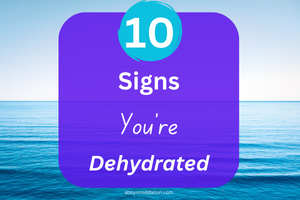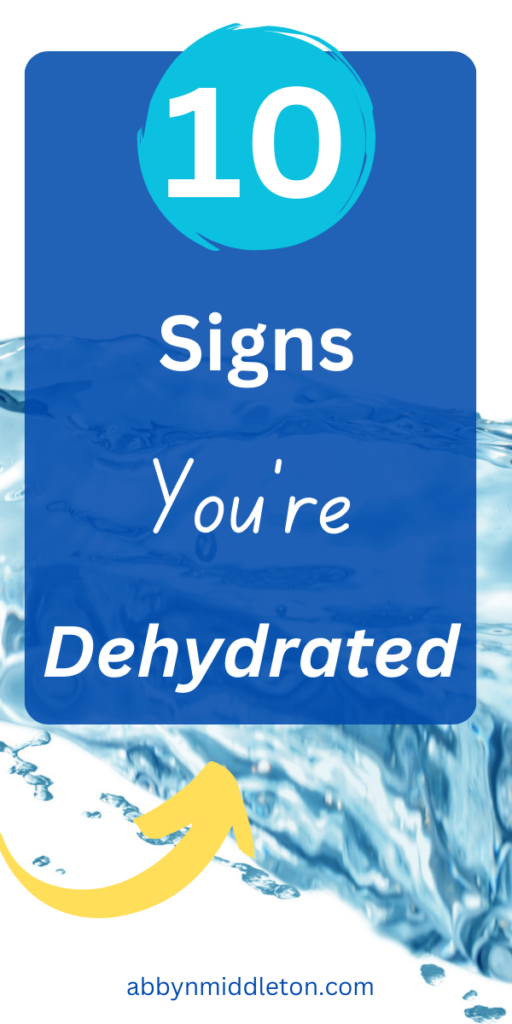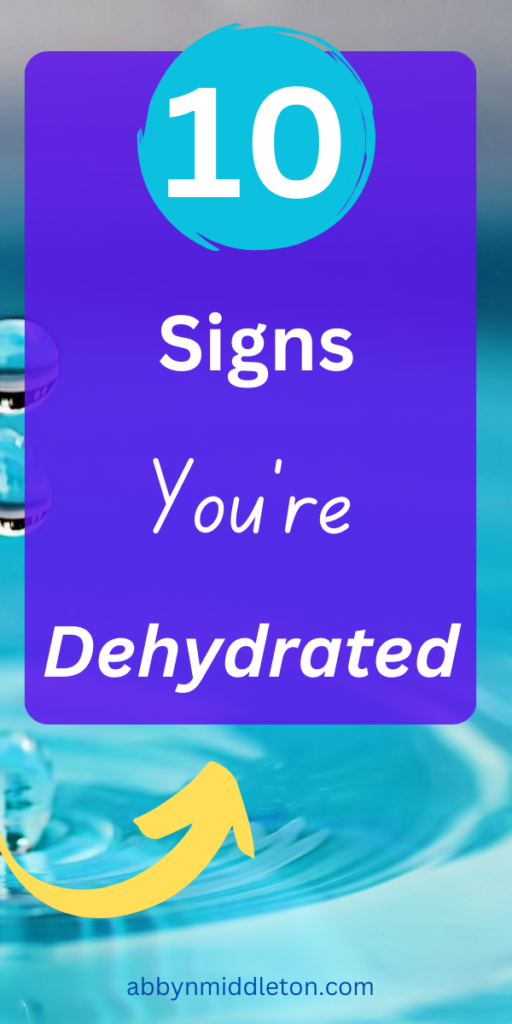10 Signs You’re Dehydrated and How to Recognize the Symptoms
Staying properly hydrated is essential for maintaining good health and overall well-being. However, many people underestimate the importance of staying hydrated and fail to recognize the signs of dehydration. In this blog post, we will explore the top 10 Signs You’re Dehydrated and How to Recognize the Symptoms. By understanding these symptoms, you can take timely action to replenish your body’s water levels and prevent the negative effects of dehydration.

- Dry Mouth and Increased Thirst:
One of the earliest signs of dehydration is a dry mouth and an unquenchable thirst. When your body lacks sufficient water, saliva production decreases, leading to dryness in the mouth. Feeling constantly thirsty, even after drinking fluids, is a clear indicator that your body needs more water.
- Fatigue and Lethargy:
Dehydration can cause feelings of fatigue, sluggishness, and reduced energy levels. When your body lacks water, it struggles to carry out its normal functions efficiently, resulting in tiredness and decreased productivity. If you find yourself constantly feeling tired, despite adequate rest, dehydration might be the culprit.
- Dark-Colored Urine:
Monitoring your urine color is an effective way to assess your hydration levels. Dark-colored urine, especially amber or honey-colored, indicates concentrated urine due to lack of water. In a well-hydrated state, urine is typically light yellow or almost clear. Keep an eye on your urine color to identify early signs of dehydration.
- Headaches and Dizziness:
Dehydration can trigger frequent headaches and dizziness. The brain is particularly sensitive to fluid loss, and when dehydration occurs, it can lead to reduced blood flow and oxygen to the brain, resulting in headaches and lightheadedness. If you often experience these symptoms, increasing your water intake may alleviate them.
- Dry Skin and Lips:
Dehydrated skin lacks proper moisture, leading to dryness, flakiness, and an overall dull appearance. Similarly, dry and cracked lips are a common sign of dehydration. Drinking enough water helps maintain skin elasticity and keeps your lips hydrated, preventing these uncomfortable symptoms.
- Muscle Cramps and Joint Pain:
Dehydration can disrupt the balance of electrolytes, such as potassium, magnesium, and sodium, in your body. This imbalance can cause muscle cramps and spasms, as well as joint pain. Adequate hydration is crucial to ensure proper electrolyte balance, reducing the risk of muscle and joint discomfort.
- Reduced Urination:
If you notice a significant decrease in your urine output or infrequent trips to the bathroom, it could indicate dehydration. When the body lacks water, it tries to conserve fluids by producing less urine. Pay attention to your urination patterns, as decreased frequency could be a sign of dehydration.
- Digestive Issues:
Dehydration can lead to digestive problems such as constipation and an upset stomach. Sufficient water intake aids in maintaining a healthy digestive system, allowing for regular bowel movements and preventing discomfort. If you experience these issues frequently, dehydration might be contributing to the problem.
- Poor Concentration and Cognitive Function:
Your brain relies on proper hydration to function optimally. Dehydration can impair cognitive function, resulting in poor concentration, difficulty focusing, and reduced memory recall. By staying hydrated, you can enhance mental clarity and ensure optimal brain performance throughout the day.
- Increased Heart Rate:
Inadequate water intake can cause an increase in heart rate as the body tries to compensate for the lack of fluids. If you notice your heart beating faster than usual, it could be a sign of dehydration. Proper hydration helps maintain a healthy heart rate and supports overall cardiovascular health.
Recognizing the signs of dehydration is crucial for maintaining optimal health and well-being. By paying attention to symptoms such as dry mouth, fatigue, dark-colored urine, headaches, and dry skin, you can identify when your body needs more water. Remember to drink water regularly throughout the day and stay mindful of your body’s hydration needs. By prioritizing hydration, you can prevent the negative effects of dehydration and keep your body functioning at its best.
Thank you so much for reading: “10 Signs You’re Dehydrated and How to Recognize the Symptoms.” New to: abbynmiddleton.com? I post weekly blog posts on health, beauty, and lifestyle! If you liked this post, you might also like my blog post on: “10 Benefits Of Drinking More Water!” For more reading on: “10 Signs You’re Dehydrated and How to Recognize the Symptoms,” check out this blog post here!


